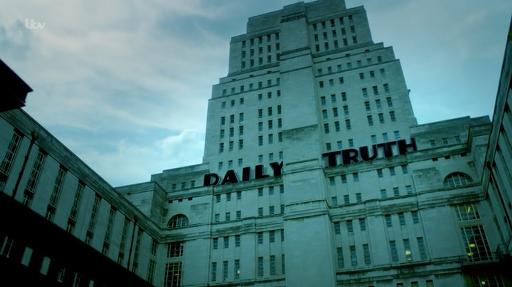2015 fantasy, ten episodes. The grandson of Robert Jekyll fights
monsters in 1930s London; some of them are human.
Urban fantasy, therefore, but with a bit of a twist that makes it
more interesting than the basic premise would suggest. There's some
heavy-handed philosophising about the need to accept one's dark side
(especially with a "good girl" for Jekyll and a "bad girl" for Hyde),
but the principal theme that struck me was the corrosive power of
secrets: yes, there may seem to be good reasons for keeping them, but
in this world simply doing that – no matter the content – always leads
to trouble, disaster and death.
As usual for televised fantasy it tries to be a multipolar setup:
Robert, and the friends he makes after he returns from Ceylon to
London, get caught up in a shadow war between MI-O (for "other"), the
local Occult Secret Service, and Tenebrae, a curiously directionless
organisation of bad guys that seems to have no goals other than power.
And then there's the other branch of the Jekyll family, and then an
unexpected sister turns up…
The plots are nonsensical, and people change sides at the drop of a
hat (sometimes by "always" having been on the other side, though they
never gave any sign of it). The principal antagonist at first is the
monstrous Captain Dance, who in spite of his casual cruelty sometimes
seems to be the only person around with a sense of humour; his absence
from most of the second half of the series is unfortunate, while
everyone goes around being Terribly Serious about everything. On the
other hand this does bring one of the best visual jokes, at least for
me, where the populist newspaper The Daily Truth is headquartered at
a certain gorgeously menacing building in central London.

Set dressing and costuming are generally excellent, and someone has
put an awful lot of care into the look of the thing; the cars in
particular are used heavily, and are utterly gorgeous.
Later, people start psychically spying on each other, unreliably
enough that it only works when the plot wants it to, and new powers
and monsters come out of nowhere as readily as secret histories.
There's no way one could build a coherent mythology out of the
constant escalations, but worldbuilding is not what this series is
about. If one were to role-play it, it would be best suited to a
purely dramatic game like Prime Time Adventures or Hillfolk, where
"I am secretly working for the other side" is exactly as significant a
revelation as "I have psychic powers". It's a confused mess, but an
enjoyable one, largely saved by an excellent young cast (I've never
heard of most of them), themselves anchored by Richard E. Grant
playing the head of MI-O and clearly having a ball as the face of
nasty-but-you-should-see-the-alternative.
It's all good fun, but it was bounced around time-slots and didn't
attract enough viewers, so these ten episodes are all there is.
Comments on this post are now closed. If you have particular grounds for adding a late comment, comment on a more recent post quoting the URL of this one.